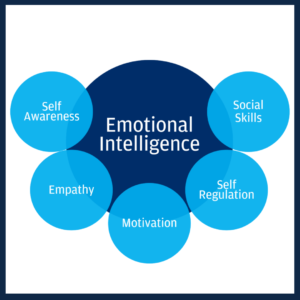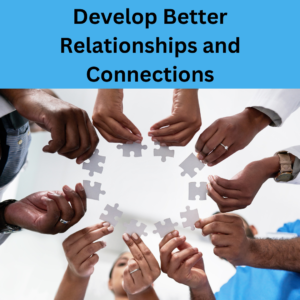In these current times where, one is trying to meet several goals, personal and professional, we often find ourselves emotionally at loggerheads with people and situations, both in workplaces and in family circles. Oftentimes, this leaves us emotionally drained, in conflict with people we care about and in deep despair, asking the questions, “Where did I go wrong? what did I do to upset them?” Perhaps some important questions to ask oneself would be – “Am I emotionally intelligent to understand other people’s perspective” and “Am I able to communicate my point of view with calm and compassion, even when I don’t agree with them?”
To achieve this mindset where one feels emotionally centered and communicates with ease, even different opinions, Emotional intelligence, and Interpersonal communication are some of the best tools in our arsenal. How are the two connected and how can they help us to become effective communicators and emotionally stable? This very thought incited me to delve deeper into this inquiry.
So, what is Emotional Intelligence, and why one should learn Interpersonal Communication skills? Let us have a look.
Emotional Intelligence
As per Daniel Goleman – emotional intelligence (EI) is the ability to recognize, understand, and manage both our own emotions and those of others. He emphasizes that the constructs of EI are related to self-awareness (knowing personal emotions), self-regulation (managing emotions), motivation (self-motivation), empathy (awareness and understanding of the emotions of others), and social skills (interpersonal relationships).
Self-awareness entails understanding our emotions, strengths, weaknesses, and how our actions affect others. Self-regulation involves managing and controlling our emotions in different situations. Motivation drives us to set and achieve goals, while empathy allows us to understand and share the feelings of others. Finally, social skills enable us to build and maintain healthy relationships.
Interpersonal communication
Interpersonal communication (IC) is an exchange of information, feelings, and meaning between two or more people through verbal and nonverbal methods. It involves the sharing of thoughts, ideas, emotions, and intentions in face-to-face interactions, as well as through various communication channels such as phone calls, emails, and social media. It encompasses both verbal aspects, such as spoken language and written messages, and nonverbal aspects, including body language, facial expressions, tone of voice, and gestures. Effective interpersonal communication involves skills such as active listening, empathy, clarity in expression, and understanding and responding appropriately to others’ verbal and nonverbal cues. It plays a crucial role in building and maintaining relationships, resolving conflicts, and fostering understanding and connection between individuals.
Now that we have understood the concepts of emotional intelligence and Interpersonal communication individually, let us get on to understand the synergy between them. Goleman’s definition underscores the importance of emotional intelligence in effective interpersonal communication, which facilitates navigating the complexities of human interactions and achieving greater emotional and social competence.
ROLE OF EMOTIONAL INTELLIGENCE IN INTERPERSONAL COMMUNICATION
Interpersonal Communication encompasses more than mere words, it encompasses how we convey ourselves through both spoken language and nonverbal cues. Emotional intelligence is instrumental in both styles of communication, facilitating effective understanding and connection with others.
Emotional intelligence and verbal communication
In verbal communication, we convey our thoughts and feelings through spoken language. Those with high emotional intelligence, skillfully select their words and regulate their message to fit the context and the emotions of their audience. They excel at active listening, offer empathetic responses, and participate in genuine conversations.
Emotional intelligence and non-verbal communication
Non-verbal communication, often deemed more impactful than spoken words, comprises facial expressions, body language, tone of voice, and gestures. Those with high emotional intelligence are skilled at reading these non-verbal cues and regulating them to enrich their communication. They are adept at perceiving others’ emotions and alter their non-verbal signals, accordingly, fostering deeper connections.
Emotional intelligence (Self-awareness and Self-Management) and communication
Self-awareness is the basis of emotional intelligence. It involves acknowledging and comprehending our emotions, strengths, weaknesses, and behavioral tendencies. Self-management is our ability to manage our emotions and is dependent on our self-awareness ability. Developing self-awareness empowers us to effectively manage our emotions, curb impulsive responses, and thoughtfully navigate our interactions. Someone who lacks self-awareness may not be able to manage emotions and project stress on others, and this negatively impacts communication in work or personal situations, damaging relations.
Emotional intelligence (Empathy) and communication
Empathy involves comprehending and resonating with the emotions of others. Strengthening empathy promotes actively listening to others while setting aside personal biases and judgments. Through nurturing empathy, we establish profound connections with others and communicate with compassion and understanding. Empathy enables effective interpersonal communication, as it helps us alter our messages to resonate with others and respond appropriately to their emotions.
Emotional intelligence (social skills) and communication
Developing and nurturing strong social skills is the basis of healthy relationships. Emotionally intelligent individuals possess strong people skills, allowing them to communicate effectively, navigate conflicts, and cooperate effectively with others. These abilities include active listening, assertiveness, negotiation, and teamwork. By improving our social skills, we can foster an environment of harmony, encourage collaboration, and forge deep, meaningful connections with the people in our lives.
These skills play a crucial role in the workplace as well. Leaders can develop better relationships and connections with employees using social skills. Workers can develop a strong rapport with leaders and peers.
In conclusion, emotional intelligence is the basis of effective interpersonal communication. Emotional Intelligence equips us better to understand the intricate interplay of emotions in human interactions. Developing emotional intelligence helps to elevate interpersonal communication skills, creating a more cohesive, empathetic, and harmonious environment in both personal and professional spheres.
Emotional intelligence serves as the pivotal factor that elevates interpersonal communication beyond a simple exchange, turning it into a profound and impactful connection.





Leave a Reply